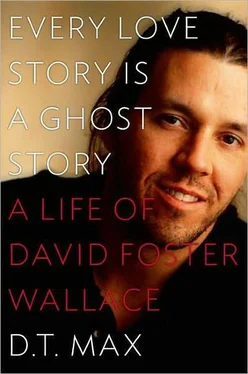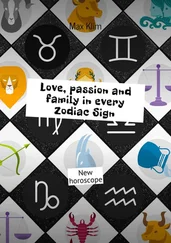Yet the world was different. What he liked about Bloomington was that he could live his life there “blissfully ignorant of most of the Red Hot Center’s various roars and hisses,” as he had written Alice Turner, adding, “My best kids are farm-kids who didn’t even know that they liked to read until I persuaded them they did.” But still they or their parents got Time and Newsweek . They had seen the pictures of Wallace and knew that the outside world regarded him as a personage. But students who wanted to talk about how it felt to be famous did not get far, and anyone who thought they would get points for reading Infinite Jest soon learned to do it out of their teacher’s sight.
His fame occasionally impinged on the campus. A man from Chicago called his department office, wanting to arrange a tennis game. Another came to the school and asked how he could meet the author of Infinite Jest and proceeded to wait the whole day, making the staff of the English department nervous. Some students from the University of Chicago arrived on a scavenger hunt, one requirement of which was to get their picture taken with Wallace (he was nowhere to be found).
Wallace began to change his phone number every few months. He would make restaurant reservations under fanciful names — one he particularly liked was Jim Deatherage, the name of a friend’s high school creative writing teacher. John O’Brien, the Dalkey Archive Press director, had thirteen dogs. They would come over and play with Jeeves and The Drone or Wallace would bring the Icky Brothers over to his house on the outskirts of the city. One day he complained to O’Brien that he no longer knew what to make of people: “People come up and say they love the book and I don’t know if they’ve read it. I don’t know who to trust anymore.”
Students had begun applying to the graduate program specifically to study with him. He was becoming a beacon for a kind of writing, not the postmodernism of the rest of the department and not the realism of Iowa and everywhere else, but a third approach, uncomfortable but sincere realism for a world that was no longer real. Making the head throb heartlike had the potential to become a literary movement. Different names were bruited for it, from the New Sincerity to Post-postmodernism. Occasionally one heard Grunge Fiction.
But Wallace did not seek acolytes. He was too competitive, too solitary, too recursive, felt his journey too painful to wish on others. For him teaching was just instilling basic skills; the student had to do the rest. He was starting to wonder how happy he really was in Bloomington anyway. “I find myself saying this year the same thing I said last year and — and it’s a little bit horrifying,” he had told Rose on his show, pointing out that most teachers stopped learning from their teaching after “about two to three years.” He became interested in yoga and meditation and practiced them regularly. With some of his recovery friends he went to a Jesuit retreat near St. Louis for a few days. The monastery observed silence to encourage reflection, and Wallace took advantage of this by bringing a bag full of work. He’d always wanted to see the Mississippi River up close, though, so he convinced Francis B. to descend with him to the riverbank below the cliffs on which the monastery stood. Disappointingly, when they got there, the flats held nothing but a dead gar. “This isn’t what I expected,” Wallace complained. At that moment, a cabin cruiser went by and a group of women lifted up their shirts. “Now that was spiritual,” Wallace said.
Sex, and the intense, complicated interchanges it brought with it, filled a place in Wallace that nothing else could. Promiscuity had been part of his life for a long time now. But being famous increased the number of women who would sleep with him or perhaps his sense that he needed to sleep with them. At his readings there were long lines everywhere he went, abundant “audience pussy”—a phrase Mary Karr used. He came back from one reading in New Orleans to tell Francis B. he had slept with a girl who was underaged. Corey Washington went to a reading in Washington, D.C., and saw two hundred people there, Wallace sedulously signing copies of A Supposedly Fun Thing . A young woman came up to them afterward. “I told you not to come here,” Wallace snapped. He was, he wrote a friend, “literally crazy” on the subject of sex. Once talking to Franzen he wondered aloud whether his only purpose on earth was “to put my penis in as many vaginas as possible.”
When Kymberly had left, she had speedily been replaced by another woman in recovery, who was also taking one of his classes in the English department. But one day when he wasn’t in the house, she read through his journal and he broke up with her. She was in turn replaced by her best friend, who was also a friend of Kymberly’s. She had two children, a favored arrangement for Wallace, part of the “fetish for conquering young mothers,” as he phrased it, that he had given to Orin Incandenza in Infinite Jest . 2The young woman chewed tobacco and they dated for more than a year. But Wallace was badly suited to relationships by now. He had been alone too long and become, to quote his description of the tennis academy in Infinite Jest , “abundantly, embranchingly tunneled.” Over time he had added idiosyncratic touches to his house. He painted one room black, where he expected to work, and put his silver velour chair in it. “I’ve wanted a black room since I was a kid,” he explained to Brad Morrow in a letter. He filled it with lamps, many removed from his parents’ house. He put his computer in the living room for rewriting and revising and covered it with the wedding veil of a friend, as if it were the site of a sacral mystery. Wallace knew himself well enough to know he did not want a TV — until he did. Then he would buy one and insist it stay unplugged. Or he would put it out at the curb for collection or give it to some of his friends from recovery. His behavior was so noticeable that the local paper, the Pantagraph , mentioned it in an item.
All this might have suggested a man not well suited to relationships, but his dedication — sexily flawed — to what might be called single-entendre connections was extremely intoxicating to some women. For them, as several remember, he was “like a drug.” 3He played Trivial Pursuit with one undergraduate and her friends in their dorm. To another he read The Velveteen Rabbit. “Real isn’t how you are made,” the Skin Horse tells the Velveteen Rabbit, “it’s a thing that happens to you.” With a third it was charades. The women would wind up sharing his bed with him, Jeeves, and The Drone for a time, cajoling him about what one called “the food with no color” in his fridge — crackers, cream cheese, cereal — and then, sooner or later, they were sent on their way. “That’s a three-day weekend I’m still paying the credit card bill on,” he said of one young woman, unchivalrously. Wallace affected not to care that some of the women were his students. He told his friend Corey Washington he was trying to get himself fired.
Wallace continued seeing therapists in Bloomington, partly to try to resolve issues with his mother, partly for his own relationship problems. Worried that he was becoming a stock Romeo, he insisted he was ready for commitment, and for an end to what he called in a later letter “serial high-romance and low-intimacy” relationships that never got truly intimate. Other than the classroom, his favored venue for meeting women was St. Matt’s, the church in whose rectory his recovery group met. His listening skills and his own practiced efforts at self-disclosure often led to breaking the rules against “thirteenth stepping.” Other recovery members warned him to stop, citing the emotional dangers of dating the newly sober, which, from his crazed relationship with Mary Karr, Wallace was no stranger to. “The odds are good but the goods are odd,” went an old recovery saw. But Wallace could not stop himself. He wrote a friend that there were times he’d walked into the twelve o’clock recovery meeting and found that he had slept with three of the ten women there, “and come close” with one or two others. His behavior seemed, even to him, at times hard to justify; he was leaving a lot of hurt in his wake. But his bigger worry was that all this seducing was most damaging to himself. He saw that the need to make every woman fall madly in love with him had made him highly manipulative, a man who went around trying to make women feel the same, as he put it in a letter to a friend, “tuggy stuff” he always felt in that moment. To him this was the most wretched of transactions — tricking someone into needing you by pretending to care. It was the thing he had written Infinite Jest in part to expose. It made you, he realized, not so different from “the people selling Tide.”
Читать дальше












